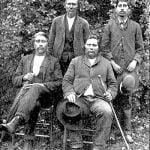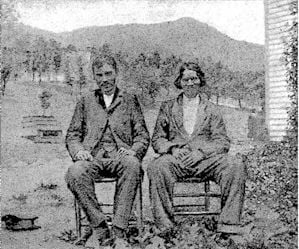
Rear: Rev. John Jackson Graham, N.C. Morgan Calhoun
Front: Wm. Ta-la-lah, Wesley Crow
At a general council assembled at Cheoh, December 9, 1868, the Eastern Cherokees placed upon record the following declaration:
We, the Eastern Cherokees, being desirous of holding our general council in some organized form and established manner and under a like form as other tribes of Indians who are desirous of adopting a republican form of government, and restricting, controlling, and compensating our rulers, do hereby enact as follows:
That hereafter each Cherokee settlement or town shall be entitled to one delegate for each member of such settlement, who shall represent them in said general council, and that said general council shall meet once in each year on _________of _________, that said general council shall, from their number when convened, elect one of their number who shall be chairman or president of said council, and who shall be president or chief of said Eastern Cherokees for the term of time so directed by said council, not exceeding four years, and in case of choice each settlement may petition said council in writing upon any subject. Said council shall have power to elect a secretary and interpreter of the council and marshal, of the nation, and fix the duties and compensation of the same. Said council shall have the power to prepare and adopt by-laws and rules for the general government of the people and the duties of each national officer, and also the compensation of said council, and assess the national funds and property to pay the same. Said council may prepare by-laws and police regulations and other rules, and submit the same to the nation in general council assembled, and a majority vote shall adopt or reject the same. They shall also prepare a system of schools in each settlement and provide for the election of a superintendent or board of trustees, who shall organize the same in accordance with said regulations. Said council may, in their discretion, fix a place and day or days for holding a national fair, where each person may present samples of grain, stock, weaving, knitting, spinning, needlework, butter, and any article of agricultural product or fruit, and domestic or mechanical product; and also a measure proving amount of crop per acre, and the number of acres cultivated in any crop, and fix committees to grant premiums thereon and name the same, and one premium for the best general system of farming to be shown by the general statement.
Signed in Cherokee: John Wayne-na, chairman; Long Bear, Allen Raider, Tramper, William MeElmore, John Ax, Sowitnooka, Ken-ska-leskee, Tall-quah-tee, James Blythe, Skeogee, John Large, Wilson Ax, Mink.
Attest:
N. J. SMITH,
Clerk of the Committee and Council.
Qualla Town, Jackson County, North Carolina, November 26, 1870.
In conformity to previous appointment, and notice having been given previously to the different towns composing the Eastern Band of Cherokees, a grand council is this day organized by appointing Snate Owl and Corntassel, chairmen, and John Lige and Samuel W. Davidson, clerks.
The credentials of the delegates were presented and referred to a committee consisting of the following: Jackson Blythe, Will McElmore, Swimmer, Young Squirrel, Ah-mah-chu-ah, Wilson Wolf, Toni Skitty, Sam Wolf, Lewis Smith, Leander Hornbuckle, John Dobson, and western district of North Carolina, mid representing the Cherokees, greatly sided inquiry respecting their present legal status in the federal courts.
Article III
Section 1. No person shall ever be eligible to any office or appointment of honor, profit, or trust who shall have aided or abetted, counseled or encouraged any person or persons guilty of defrauding the Eastern Baud of the Cherokees, or who may hereafter aid or abet, counsel or encourage any pretended agents or attorneys in defrauding the Eastern Band of Cherokees.
Article IV
Section 1. It shall be the duty of the annual council to pass such rules and regulations as may be necessary and proper, and to decide differences by arbitrators to be appointed by the parties who may choose that summary mode of settlement.
(Abstract.)
Supreme executive, the principal chief, term 4 years; vice or assistant chief. By males of 18 years. Eligibility of either, age 35, and at least one-fourth Cherokee, of band, In case of death, resignation, or disability of both council appoint until removal of disability or successor be elected. Councilman must be 21. Compensation of chief and vice not changeable during term.
Oath of principal chief;
“I do solemnly swear (or affirm) that I will faithfully execute the duties of principal chief of the Eastern Band of Cherokees, and to the best of my ability, preserve, protect, and defend the constitution of the Eastern Band of the Cherokee Indians”.
Principal chief may on extraordinary occasions convene the council at such place as the council shall designate as the seat of government.
Principal chief from time to time give information as to the state of affairs and recommend measures as he may think expedient. lie shall take care that the rules and regulations be faithfully executed; shall visit the different towns and settlements at least once in 2 years.
All officers and members of council take oath, etc. Council for 2 years, Treasurer chosen by council for 2 years and give bond, No mosey drawn except by warrant from the president in consequence of appropriations by council. Treasurer receive and account for moneys at each session of the anneal council.
Article V
(Abstract.)
No person eligible to any office who denies the existence of a God or a future state of rewards and punishments. Free exercise of religious worship and serving God forever enjoyed, but not construed as to excuse acts of licentiousness inconsistent with the peace and safety, etc. Council may decide the expediency and principal chief nominate to council when necessary to send a delegate to transact business with the United States, and be shall keep up a friendly correspondence through the medium of its proper officers. All commissions to be in the name and by the authority of the Eastern Band of Cherokee Indians, scaled with the seal of the probate court of the county whore the council is held, attested by clerk of council, and approved by the principal chief. Religion, morality, and knowledge being necessary to good government, the preservation of liberty, and the happiness of mankind, schools and the means of education shall forever be encouraged and cherished by the Eastern Band of Cherokee Indians. Annual council may propose amendments as two-thirds deem expedient, the same not to be passed until the meeting of the next council.
Article VI

Three daughters and grandson of Chief Smith
Council shall consist of 2 from each town or settlement of 100 souls, of 1 extra on an excess of 200, and for less than 100 still 1. Council, at the annual session, shall appoint 2 judges of elections. In fault of election, a majority may send a delegate with certificate, with the names of those selecting the delegate. Election to he held on the first Thursday in September. Executive council to consist of principal chief, assistant chief, and 3 associates, nominated by the principal chief and confirmed by the council. The annual council shall be held on the first Monday of October at place designated by council, or, on emergency, by the principal chief. The annual council shall be called to order by the assistant chief, and a chairman and clerk be elected. In the absence or neglect of the assistant chief any member of the executive council may organize the council. The officers of the council shall be 1 first and 1 second clerk, an interpreter, marshal, messenger, and doorkeeper, The oath may be administered by any officer of the state or the United States authorized to administer an oath. Conviction of felony shall exclude from office. The annual council may, by a commission, provide for the purchase of land for the Eastern Baud of Cherokee Indians; provided, that any commission provided for under this ordinance may be nominated by the principal chief and confirmed by the annual council; provided further, that no act of such commission shall be construed to interfere with or in any manner impair the rights of individual members of said baud. The annual council shall, by appropriate legislation, provide a public school system for the Eastern Baud of the Cherokee Indians. The veto power exists except against a two-thirds vote. . Style of’ enactment: “Be it enacted by the annual council of the Eastern Band of the Cherokee Indians”, etc.
J. W. HILDIM, and T. Z. P. ENOLA, Chairman,
(Signed)
Attest: John G. Tatham, Secretary of Council.
Henry Smith, Interpreter.
Approved: Loyd R. Welch, Principal Chief.
Cheoh Council-Ground, October 13, 1875.
Officers and Council of Eastern Band of Cherokees: 1890-1891.
Principal Chief-Nimrod J. Smith (Cha-la-di-hih, Charles the Killer).
Assistant Chief-John Going Welch (Tsani, Always Going).
Chairman of Council-Jesse Reed.
Council-Stilwell Saunooka (Shawnee), Andy Standing Bear (Enidth Ahrwigadawga), Wesley Crow (Caw-dash-ry-eh-lig-is-ki, Crow Marker), Davis George (Dew-isi-ool-ay-oeh, Went Astray), Sampson Owl (Sap-mi-si-nih Co-goo-coo, Hooting Owl), Bird Sidolanita (Young Squirrels), Jessean Climbing Bear (Yo-no-ga-la-ki), Abraham Hill (O-quan-ih), Morgan Calhoun (Au-gan-aahf-to-dah, Ground Sausage Meat), Suite Martin (Suy-e-ta Tin-tlu, Mixed Martin), Will (Ttah-lab-lah, Redheaded Woodpecker), John Mullethead (Tsis-da-qua-lun-na, Mullethead Fish), Armstrong Cornsilk (Ka-nau-tsi-da-wi Oo-ne-moo-di), and John Davis (Axe, no Indian name).
Incorporation Of The Eastern Band Of Cherokee Indians 1889

son-in-law of Chief Smith
Samspson George on left
By an act of the general assembly of North Carolina, ratified the 11th day of March, 1889 (Laws of North Carolina, 1889, chapter 211, page 889), the North Carolina or Eastern Cherokee Indians, resident and domiciled in the counties of Cherokee, Graham, Jackson, and Swain, were created a body politic and corporate under the name, style, and title of “The Eastern Band of Cherokee Indians, with all the rights, privileges, franchises, and powers incident and belonging to corporations under the laws of the state of North Carolina”.
By section 2 said Eastern Band of Cherokee Indians was authorized to sue and implead, and might be sued and impleaded, touching and concerning all the property of whatever nature held in common by the said band in said counties.
By section 3 any grants to any person or persons for any of the land held by said Eastern Band of Cherokee Indians, and under whom said Indians claimed title, as also all deeds made by commissioners of the state to any person or persons fins what are known as Cherokee lands hold by said Cherokee Indians in said counties and under whom said Cherokees claim, are held as valid.
By section 4 it was provided that in all cases where titles or deeds have been executed to the said Eastern Band of Cherokee Indians, or any person or persons in trust for them under that name and style, by any person or persons, either collectively or personally, officially, or in any capacity whatever, such deeds or titles should be held as valid against the state and all persons or any person claiming by, through, or under the state by virtue of any grant dated or issued subsequent to the aforesaid deeds or titles to the said Eastern Band of Cherokee Indians.
By section 5 it was provided that in case any person or persons claiming any part of the lands described in the preceding sections adversely to the said Indians under colorable title or titles shall be sued by reason of such adverse claim, or any possession under such colorable title or titles, said act shall not be used in evidence on either side nor in any way prejudice the rights of either party, but such suit or suits shall be determined as if said act had not been passed.
By section 6 said act took effect from and after its ratification.


